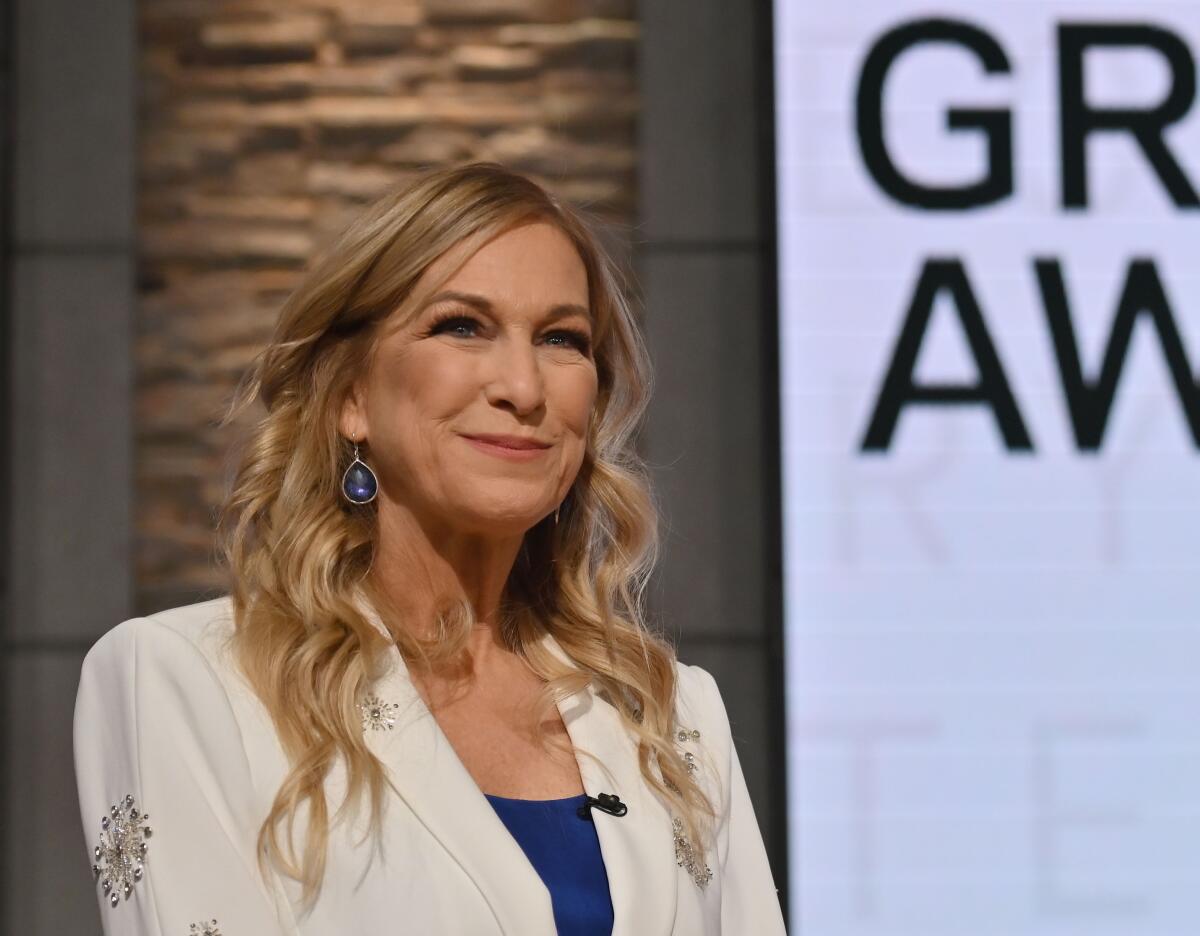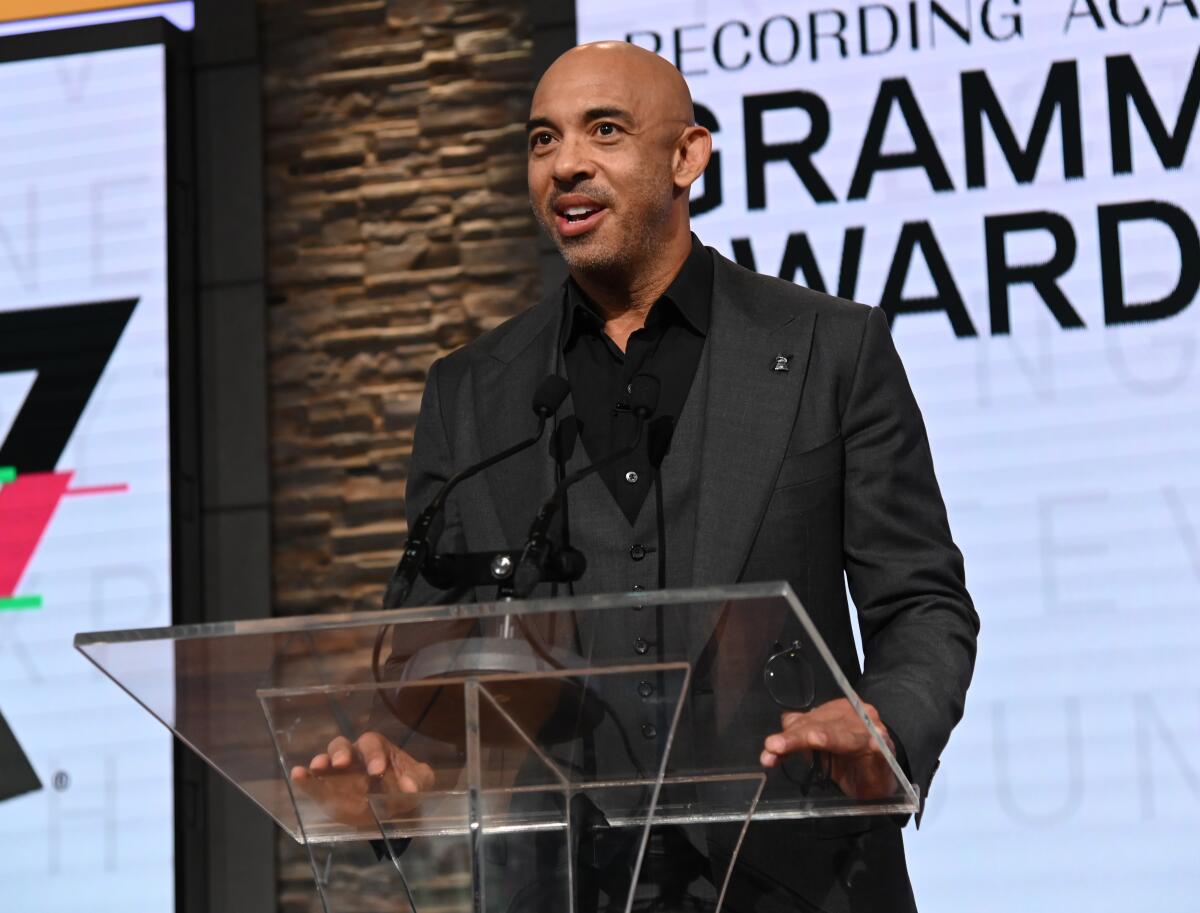Recording Academy alleges Deborah Dugan demanded ‘millions’ to withdraw complaint of wrongdoing and resign

- Share via
The war of words and inflammatory accusations between the Recording Academy and its recently sidelined president and chief executive, Deborah Dugan, heated up further Monday as board Chairman Harvey Mason Jr. accused Dugan of offering, through her lawyer, to drop her complaint of wrongdoing and resign in exchange for a multimillion-dollar contract buyout.
Dugan reportedly submitted a memo to the organization’s human resources department detailing her concerns about practices she had discovered including voting irregularities, financial mismanagement, “exorbitant and unnecessary” legal fees and “conflicts of interest involving members of the academy’s board, executive committee and outside lawyers.”
Dugan only took the position on Aug. 1, but on Thursday, just 10 days ahead of the 2020 Grammy Awards ceremony, she was placed on administrative leave in response to a complaint of misconduct filed by “a senior member of the Recording Academy team.”
Mason’s memo to academy members, a copy of which was obtained by The Times, said the employee’s complaint contained “serious allegations of a ‘toxic and intolerable’ and ‘abusive and bullying’ environment created by Ms. Dugan towards the staff.”
A source close to Dugan recently characterized the situation as “a routine HR matter.”

Mason also wrote that, “After we received the employee complaints against Ms. Dugan, she then (for the first time) made allegations against the Academy. In response, we started a separate investigation into Ms. Dugan’s allegations.
“Ms. Dugan’s attorney then informed the Executive Committee that if Ms. Dugan was paid millions of dollars, she would ‘withdraw’ her allegations and resign from her role as CEO,” Mason’s memo stated. “Following that communication from Ms. Dugan’s attorney, Ms. Dugan was placed on administrative leave as we complete both of these ongoing investigations.”
Billboard cited two sources at the academy who allege that she had asked for $22 million to withdraw her complaint and that the academy countered with a significantly lower figure, which she rejected.
After the academy went public last week with the misconduct allegation, Dugan’s lawyer, crisis litigator Bryan Freedman, issued a statement saying, “What has been reported is not nearly the story that needs to be told. When our ability to speak is not restrained by a 28-page contract and legal threats, we will expose what happens when you ‘step up’ at the Recording Academy, a public nonprofit.”
On Monday, New York employment litigator Douglas Wigdor’s firm announced that he had joined her legal team. Wigdor is representing a Jane Doe in the impending criminal trial of movie producer Harvey Weinstein. Freedman represented journalist Megyn Kelly when she exited NBC’s “Today” show in October 2018, and also is representing “America’s Got Talent” employee Gabrielle Union in her suit alleging a toxic work environment and racist behavior on the show’s set.
Of Dugan’s case, Wigdor told The Times by email on Monday, “We will be responding very soon to set the record straight.”
Both Kelly and Union have issued statements sympathetic to Dugan on their Twitter feeds.
Kelly wrote, “What did Grammys CEO Deborah Dugan report to HR re the Grammys that got her fired? Why is a PUBLIC, non profit allowed to muzzle execs who file HR complaints? What’s in her complaint? The public deserves to know. #deborahdugan #thisisehathappenswhenwomenstepup #grammysstepup”
And over the weekend, Union tweeted, “Coulda sworn this is the same board that told women to ‘step up’,” Union tweeted over the weekend. “Clearly what they really meant was stand down, turn a blind eye to problems, or be fired. #DeborahDugan truly stepped up & tried to make necessary changes & was shown the door. Been there, done that, got fired too.”
Mason’s memo continued, “I’m deeply disturbed and saddened by the ‘leaks’ and misinformation, which are fueling a press campaign designed to create leverage against the Academy for personal gain. As Grammy week is upon us, I truly hope we can focus our attention on the artists who’ve received nominations and deserve to be celebrated at this time of the year, and not give credence to unsubstantiated attacks on the Academy. To do otherwise is just not right.”
Dugan was hired last year in response to public relations crisis that erupted in 2018 when then-President and Chief Executive Neil Portnow said backstage after the male-dominated Grammy Awards ceremony that it was time for women to “step up” to receive equal treatment at the event.
He quickly apologized and said the comment was taken out of context, but many musicians, record executives and others called for him to step down. In the ensuing weeks, Portnow announced that he would not seek an extension of his latest contract, which was due to expire on July 31, 2019.
In the meantime, the Recording Academy formed a 15-woman, three-man task force to study “conscious and unconscious bias” in the music business and within the academy that was impeding women, people of color and members of the LGBTQ community from being represented in step with the demographics of the country’s general population.
The task force issued its final report last month, with 18 specific recommendations for change. In several places, it referred to the gender and racial imbalances within the academy’s 25,000-strong membership as well as its 40-member board of trustees and the select nominating review committees that oversee many of the highest-profile Grammy Award categories.
The 62nd Grammy Awards take place on Jan. 26 at Staples Center.
More to Read
The biggest entertainment stories
Get our big stories about Hollywood, film, television, music, arts, culture and more right in your inbox as soon as they publish.
You may occasionally receive promotional content from the Los Angeles Times.











